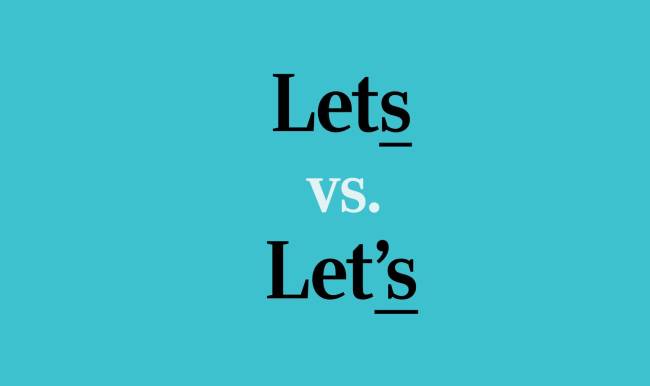Let’s and let’s sound exactly the same, and the only visual difference is the apostrophe, which resembles a floating comma. Nevertheless, they are different forms of the same verb, let, and have different meanings.
Table of Contents
How to Use ‘Lets’
Lets (without the apostrophe) means to allow, release, or leave in third-person singular. You can say that your friend “let you borrow his class notes” or that your neighbor “let her dog run free.”
How to Use ‘Let’s’
It is the contraction of let us, a phrase meaning roughly we should, as in “Let’s go to the park.” The uncontracted form is reserved for formal ceremonies and poetry, such as T.S. “Let’s go then, you and I,” from the title of “The Love Song of J. Alfred Prufrock.” (The phrase “let’s us” is nonstandard for “let’s,” so avoid using it.)

Examples
The following examples illustrate the differences between the two terms and how they should be used:
- Occasionally, my grandmother lets us play on the long stretches of soft grass at the park in the evenings. Allowing or permitting is the meaning of lets here.
- To avoid traffic, Sharon lets her twins out of the car a block from the campus when she drives them to school. Let’s means to release in this example.
- Tonight, let’s find a good restaurant with a patio where we can relax and enjoy the spring weather. Let’s means let’s do it.
- I hope the waiter will leave us alone and not keep refilling our water glasses. As an example, let’s means we should and let’s means we should leave.
- My heart leaps into my throat when the trapeze artist lets go of the bar. As part of the verb phrase lets go, lets means release.
Related Grammatical Concepts
There is a significant difference between let us and let’s when it comes to formality. Generally, contractions are less formal than uncontracted forms, and this is certainly the case here. “Let us pray,” which is used in religious ceremonies, is more formal than “Let’s pray that the crosswalk signal won’t tell us to stop.”
It is incorrect to use leave instead of let in phrases such as “let me be” (not “leave me be”) or “let’s go” (not “leave us go”).
Let’s not is the appropriate negative form of let’s, as in “Let’s not tell anyone where we’re going.”
